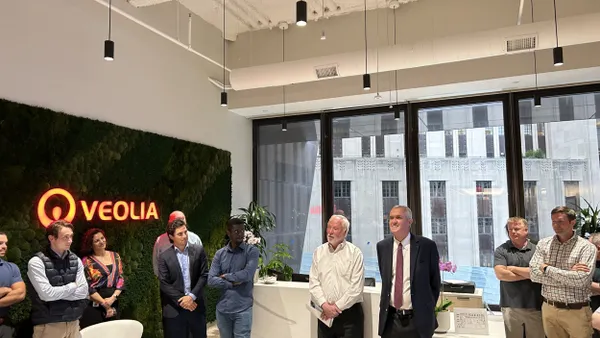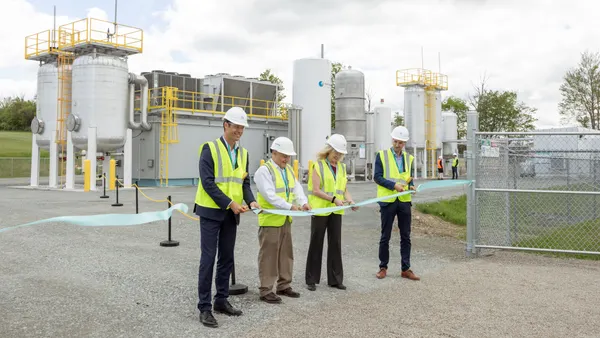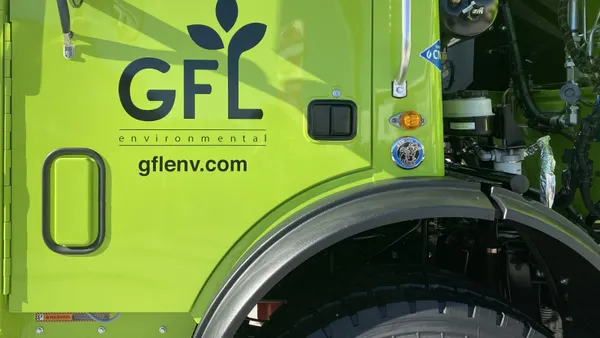Q3 Earnings
| Revenue | $1.39B |
| Year-Over-Year Change | 1.56%▼ |
| Net Income | $158M |
Waste Connections reported another quarter of incremental pandemic recovery, with sequential improvements in every line of business, while also showing signs that recovery may have plateaued near term. Despite numerous uncertainties – namely the election outcome and the pandemic's trajectory – executives remained cautiously optimistic.
"As we look ahead, we expect to emerge from this challenging period better positioned financially, with tremendous flexibility with respect to capital allocation, and operationally, with higher operating leverage in solid waste and both safety-related incidents and voluntary turnover levels already achieving multi-year lows," said CEO Worthing Jackman during an earnings call.
COVID economy
- Solid waste volumes were down 5.7% in the third quarter, driven in large part by ongoing pressures from the Northeast and Canada, with landfill tonnage down for MSW, special waste and C&D. Volume improvements were most notable in regions that had early and comprehensive shutdowns, as they continue reopening.
- An estimated 68% of commercial customers that suspended or reduced service, and 57% of associated revenue, have now come back in some form (as compared to 53% and 42% respectively in the second quarter). Commercial revenue recovery rates range from lows of 50% in the Northeast to 60-65% in other areas.
- E&P revenues were down 64% year-over-year, with some signs that declined drilling activity may have bottomed out. Revenue from resource recovery activities (recycling, biogas and renewable energy credits) were up 25%, driven in part by higher residential recycling volumes and improved cardboard pricing.
While Waste Connections reported multiple indicators of incremental recovery, there were also signs that trend may have peaked in areas that reopened the earliest or had fewer restrictions. By contrast, parts of Canada as well as New York City still have room to grow, although there was recognition some commercial customers may never come back.
"We definitely assume that there are some permanently closed shops," said Jackman, adding a new stimulus package could help that but "without a doubt there will be casualties in small business as a result of the pandemic.”
CFO Mary Anne Whitney said bad debt levels remained stable, with customers generally paying up when they do reopen, but added "we’re mindful of the fact that cancellation rates are still what I would say is artificially low.”
The two also noted current contract negotiations are factoring in the now normal effects of COVID-19, such as higher residential volumes and higher operating costs – along with current recycling markets if they aren't reflected – and confirmed other early signs of economic shifts. Jackman said city residents moving to more rural areas is leading to upticks in local commercial business, but called it too early to define a broader trend.
Regardless of how events unfold, Waste Connections believes it has adapted to the current economic environment – like it did after the Great Recession – and any further economic improvements will be additive at this point.
“Look, the recovery that's plateaued right now – but for some markets that are still expanding – that’s the jumping off point for any further recovery within that customer base. But we’ve already adjusted or adapted the shape of the business based on the realities that we currently have," said Jackman.
ESG
- Waste Connections also put out an annual sustainability report outlining new targets around greenhouse gas emissions and other areas. The company pledged to spend $500 million to achieve these targets, with Jackman specifying that would be part of normal capital expenditure levels over a period of 15 years.
- Beyond electric collection vehicles, the company also sees big potential in landfill gas-to-energy projects. “The maturing of our landfill network creates more opportunity looking ahead for biogas capture investments, with very attractive ROIs," said Jackman. "If a changing administration comes, and you know their platform, you know the value of that line of business should go up dramatically.”
- The new report also includes targets to reduce safety incidence rates by 25% and reduce voluntary turnover, trends that have already been happening this year. Executives pointed to a pledged $35 million in pandemic-related spending for supplemental pay to frontline workers, among other items, as part of that process.
Looking ahead
- Despite cautious optimism, executives also recognized the pandemic's next phase could be "pretty widespread" and said efforts are ongoing to make sure employees remain vigilant. Following the enactment of a $15 hour minimum wage, the company recently gave bonuses of up to $800 to an estimated 90% of its frontline employees to help morale.
- So far this year, Waste Connections has acquired 16 companies, across 11 states and one province, worth an estimated annual revenue of $135 million. Additional deals are expected, driven in part by seller concerns about future tax changes as well as pandemic exhaustion. Jackman projected steady activity will continue regardless of the election outcome.
- For the fourth quarter, Whitney said the company is estimating $1.335 billion in revenue, with revenue for resource recovery and E&P holding steady, solid waste price growth of 4% and volumes down by 6%. Based on current conditions, the company anticipates meeting or exceeding its revised annual free cash flow target of $805-835 million and double-digit growth in that area for 2021.











